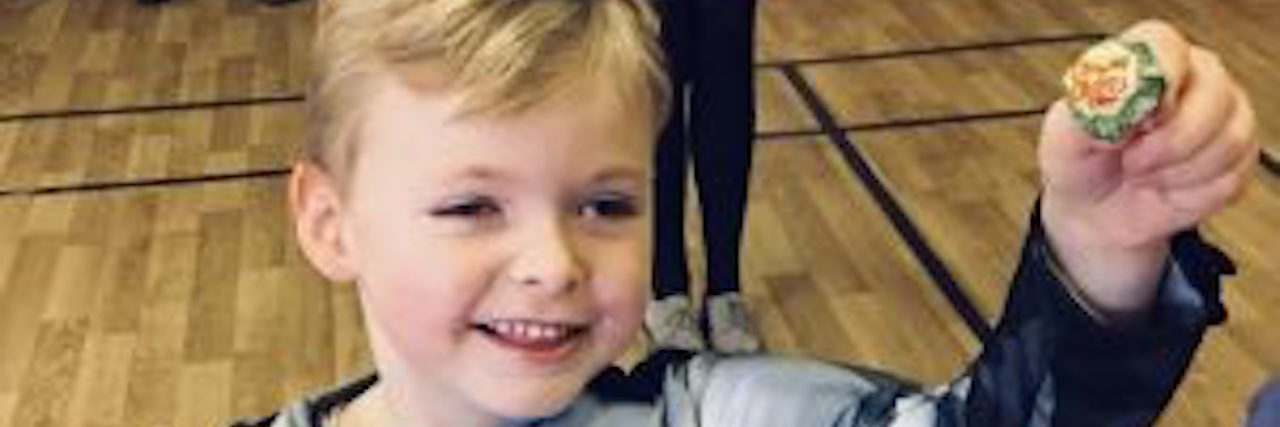Having a child with a rare disease can be complicated. We spent so long with Freddie being undiagnosed and having to try to explain his special needs, that I realize having a rare diagnosis still leaves us pretty much in the same place.
Wednesday 28th February was Rare Disease Day. It’s a day when we can focus on educating others on rare diseases and what it means for families like mine. In this vein, I’d like to share what having a rare disease means for Freddie.
TUBA 1A is a protein gene and in short, these tubulin genes are needed during brain development for cell division and healthy brain growth. People found to have TUBA 1A will have vast developmental differences. Our particular superhero, Freddie, is affected in the following ways.
It affected his brain development, first seen at my 20-week scan. The usual walnut patterns of grooves and folds seen in a typical brain are much smoother on Freddie’s. In some cases, the brain can be almost completely smooth. This can cause a wide range of difficulties and disabilities from near-normal growth and progression to being life-limiting. There can be difficulty swallowing, seizures, failure to thrive and atypical or dysmorphic facial features. We have been told that our beautiful boy has dysmorphic features. We just think he is super handsome.
Plus, a part of the brain called the cerebellum is small and underdeveloped in Freddie. When this part of the brain is underdeveloped it can lead to intellectual disability, global development delay (GDD) and movement problems. It is responsible for voluntary movements including posture, coordination, balance and speech.
There are other areas of his brain which haven’t developed properly and these differences can also be seen in others with TUBA 1A, so they all contribute to his difficulties. To add to this, he also had a stroke before birth. We think this is the biggest contributing factor to his much weaker left side.
Freddie has a smaller than average head (microcephaly). He is only around the 2nd percentile for head circumference. He has low muscle tone, a learning disability, communication difficulties including developmental verbal dyspraxia/apraxia, plus a neurological eyesight condition, a bilateral squint and bowel issues. He also needs more time to process what he sees and hears and to act on those things. Occasionally he is ignoring me on purpose, but most often he is processing what is going on around him. He has poor balance, falls and trips regularly and has poor coordination in most areas. These include walking, personal care, feeding himself and eating/swallowing.
He has also, in the last 18 months, started to show signs of suspected absence seizures. The neurologist isn’t totally convinced this is what is happening, although we have been told to look out for epileptic activity due to the areas of his brain that are damaged. While we wait to decide, he will be tested in the cardiology department for any irregular heart function.
In the beginning, the medical teams were not overly confident he would be able to do very much at all. Ollie and I, although frightened it might be the case, never took that stance. Freddie has had to build many many new pathways in his brain to enable him to walk, talk, hear and eat. Every single little daily task you and I might take for granted has had to be learned and programmed through hours and hours of therapy.
We taught him everything manually, hand over body and hand over hand. Everything from sitting and learning to use his hands and arms to prop so that he didn’t fall backwards when sitting. We helped him learn to roll over, how to move his legs, and to force a roll. We showed him how to crawl, how to move each leg individually and how to get his body to push him forward. We had to coordinate that with alternating his arms so that he didn’t fall on his face. It happened a lot in the beginning. We also showed him how to get into a standing position from sitting on the floor. We even had to teach him hand over hand, how to clap his hands together. Then came teaching him hand over hand how to hold a spoon and how to move it towards his mouth and get it actually into his mouth.
If you imagine an adult who has had a stroke and how they often need to re-learn all the skills they have lost, this is what we did for Freddie. This is what he has and continues to overcome and achieve.
We have always believed anything is possible. Even with having read all the documentation available on TUBA 1A, I don’t focus on the typical outcomes. Freddie is unique and will go on to achieve much more. That is how we get through the days.
Don’t let anyone put limitations on your child. Advocate for them and give them every opportunity within your power. You are your child’s expert and the biggest driving force to their individual success stories.
We want to hear your story. Become a Mighty contributor here.

